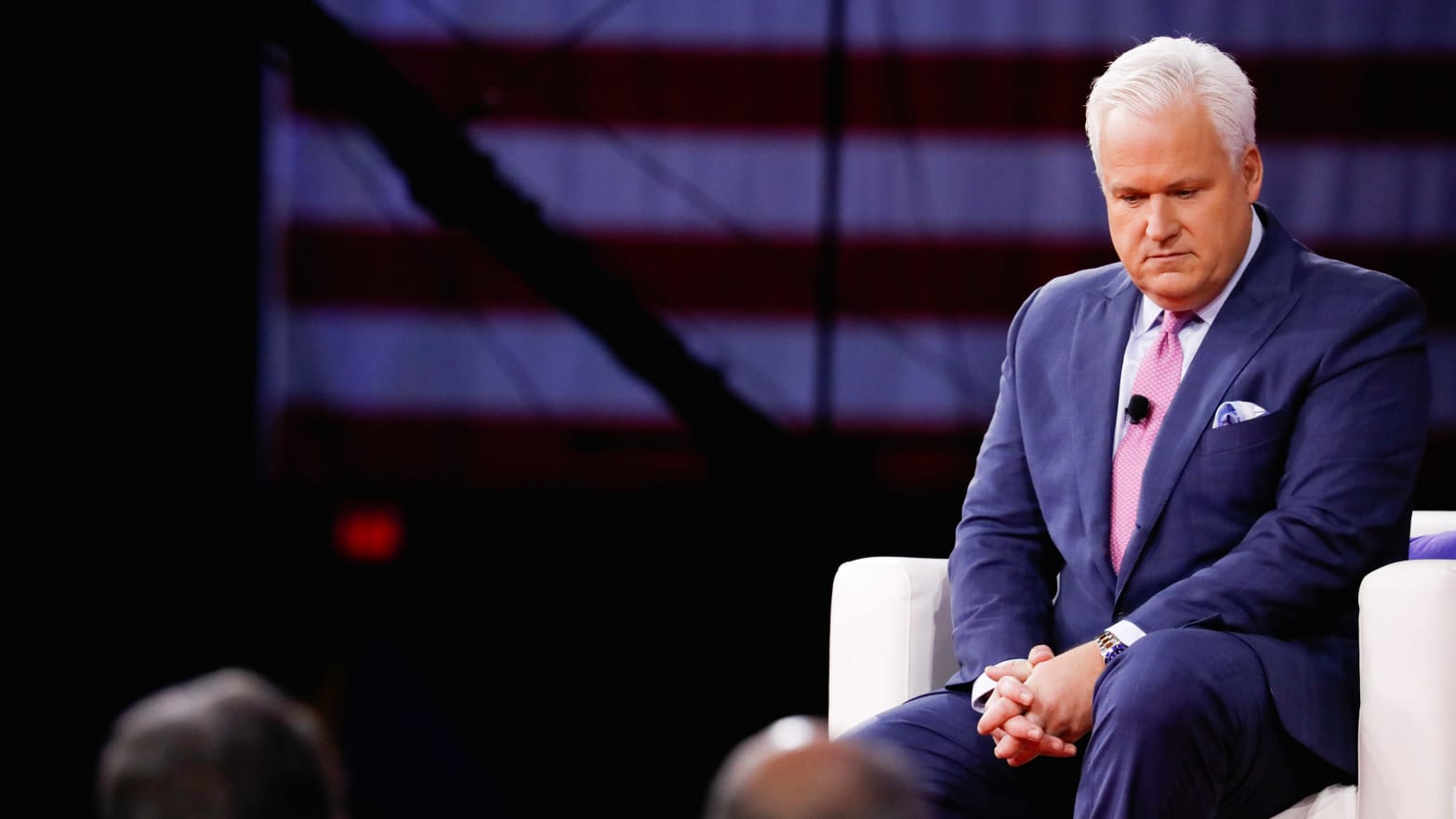According to court documents filed on Thursday, the legal team of conservative icon Matt Schlapp has formally denied that he committed sexual battery against a former Herschel Walker campaign staffer who has accused the CPAC chair of groping his crotch against his will—and he’s asking the court to name the accuser.
Media reports have omitted the accuser’s name at his request, citing concerns for personal and professional retaliation. But Schlapp’s legal team is requesting that the accuser be unmasked, while also pinning the accuser’s injuries on the accuser himself.
“The Schlapps deny that Mr. Schlapp committed sexual battery,” the defense wrote in its response, asking the court to dismiss the case with prejudice. The filings, which come in response to the lawsuit the accuser submitted two weeks ago, also deny the defamation and conspiracy counts, and seek to reclaim legal costs.
While the defense goes to great lengths to argue that the accuser has “publicly smeared” the Schlapps, they make no defamation counterclaims of their own. At one point, without providing evidence, they allege that the accuser’s lawsuit, simply by including the Schlapps’ home address, led directly to threats against their family, even though their mansion has been featured in multiple media reports.
Still, the Schlapps did not file a countersuit.
The documents, six filings in all, were submitted by Schlapp’s lead attorney Benjamin Chew, of Johnny Depp’s defamation defense team. They constitute the Schlapps’ first official response to the $9.4 million sexual battery, defamation, and conspiracy complaint that the staffer filed under a “John Doe” pseudonym in Alexandria, Virginia, civil court last month against Schlapp and his wife, conservative commentator and former White House communications strategist Mercedes Schlapp.
Instead, the defense argued, it was the accuser’s fault. The answer to the complaint says that “any alleged injuries” were not caused by the Schlapps, “but instead were caused by Plaintiff's own negligence, conduct, actions, or inactions, or were the result of other alternative causes, or a combination thereof.”
(Documents filed in the City of Alexandria Circuit Court are public, but are currently not available online.)
In their response, Schlapp’s attorneys begin by writing that the accuser’s suit “reeks of gamesmanship and hypocrisy.” The next sentences lay out a series of complaints about the staffer’s anonymity, claiming he has used it as a “shield” in a “media campaign” as he “smeared two highly-respected members of the community here in Alexandria.”
The response does deny a number of specific details, such as a moment at one bar where Schlapp allegedly bumped into the accuser’s handgun and did not appear to know that SIG Sauer was a firearms manufacturer. However, it also admits key claims that corroborate the where and when of the original allegation, which The Daily Beast first reported in early January.
Notably, the filing acknowledges that Schlapp went out to two Atlanta bars with the accuser following a Walker event in October, and it admits that Schlapp did not go to a second Walker rally he was apparently expected to attend the day after the alleged assault. The response also confirms Schlapp’s attempts to communicate with the accuser the following morning, including one text message where Schlapp—after being informed that his behavior had made the staffer “uncomfortable,” and the campaign had arranged for a new driver—asked the staffer if he could “see it in your heart” to call him by the end of the day.
Curiously, the denials appear to skip the most pivotal allegation in the complaint—the moment where Schlapp allegedly groped the staffer’s crotch in the car on the way back to Schlapp’s hotel.
That allegation, paragraph 28 in the complaint, reads in full: “Then, Mr. Schlapp moved his hand and began aggressively fondling Mr. Doe’s genital area in a sustained fashion. Again, Mr. Doe was frozen with fear and panic from what was happening.”
But the denial, responding to paragraphs in sequence, appears to refer to that most striking claim—which does not characterize the alleged physical contact as specifically illegal or unwanted—by the wrong number: paragraph 24, not paragraph 28.
Asked to comment on the possible (albeit critical) typo, Schlapp’s lawyers did not immediately reply.
Schlapp’s squad also asked the court to publicly reveal the accuser’s identity, portraying his anonymity as an unfair advantage. It’s unclear, however, how a public unmasking would make it easier for the Schlapps to proceed in any court—except the court of public opinion.
For instance, the defense team admitted already knowing the accuser’s identity, as well as specific “sordid” and “unsavory” information about his background, which they proceeded to sew into the filings themselves. (The Daily Beast is withholding those specific claims here because the details could compromise the identity of the staffer, who lost his job when those decade-old claims mysteriously resurfaced nine days after he filed his lawsuit.)
In the motion for identification, the defense argues that “Mr. Schlapp has no record whatsoever of sexual or other misconduct,” but that “Plaintiff has already succeeded in dragging Mr. Schlapp’s name through the mud, to the delight of his political opponents and journalists hungry for a scandal, however frivolous.”
The lawyers requested the court schedule a hearing on the motion to unmask for March 8. That happens to be four days after this year’s CPAC conference in Washington, D.C.
It may be a tall order.
Last month, a federal judge granted the staffer’s right to proceed anonymously in a related defamation lawsuit against Jan. 6 rally fundraiser and Schlapp representative Caroline Wren, according to court records reviewed by The Daily Beast.
But the judge went even further. She ordered that Wren—who has already disclosed the accuser’s name in multiple social media posts—“is prohibited from publicly disclosing plaintiff’s identity or any personal identifying information that could lead to the identification of plaintiff by nonparties, except for the purposes of investigating the allegations contained in the Complaint and for preparing an answer or other dispositive motion in response.”
In one intriguing move, Schlapp’s counsel subpoenaed one of the Schlapps’ neighbors—prominent criminal defense lawyer Barbara Van Gelder—for “all communications” with the Schlapps relating to the staffer and his allegations. That subpoena also specifies “all communications between you and any media outlet or organization that refer or relate to either of the Schlapps.”
That’s apparently in reference to a text message from Mercedes Schlapp included in the staffer’s lawsuit, where Schlapp told “a neighborhood group chat or text” that the accuser was a “troubled individual” who had been “fired from multiple jobs, including one firing for lying or lying on his resume”—claims the accuser says are “false and defamatory.”
Van Gelder, a Democratic donor, has represented conservatives in high-profile cases. One of those clients was David Safavian, the current general counsel for the American Conservative Union—Schlapp’s organization—who in 2006 was found guilty of obstruction of justice and lying to investigators as part of the sprawling corruption investigation into disgraced lobbyist Jack Abramoff. Van Gelder also represented Mark Judge, the high school friend of Supreme Court Justice Brett Kavanaugh, when the FBI interviewed him in connection to Christine Blasey Ford’s sexual assault allegations in 2018.
Van Gelder could not immediately be reached for comment.

